SLATON, Texas — The Black girl’s hands were shaking as she approached a white classmate in gym class.
“I told you,” Autumn Roberson-Manahan said, her voice quivering, “to stop using that word.”
Autumn, a 17-year-old senior at Slaton High School, said she’d asked the boy four days in a row to stop saying the N-word in class. And for four consecutive days, according to Autumn and a half-dozen other students later interviewed by the school principal, the boy had disregarded her pleas.
He’d said the slur while talking trash on the basketball court, Autumn recalled: “Oh! I’m ballin’ on y’all n----s.” And while cleaning up at the end of class: “These dumb n----s left the balls out again.” That day, Oct. 27, he’d said it again, smirking after having dribbled past a student and hitting a jump shot, Autumn said.
By then, Autumn, a straight-A student and one of only two dozen Black students at her small-town high school outside Lubbock, had been complaining about racial harassment involving three other classmates since the second week of school, according to interviews with Autumn and her family, messages they sent to administrators and a civil rights complaint filed Monday with the U.S. Department of Education. In September, she’d secretly recorded two boys in class calling her the N-word. When the alleged harassment continued, Autumn told administrators she was struggling to focus on her schoolwork. Her parents tried to intervene, demanding to speak with the principal and writing to the superintendent.
But the racist comments didn’t stop, according to the federal complaint.
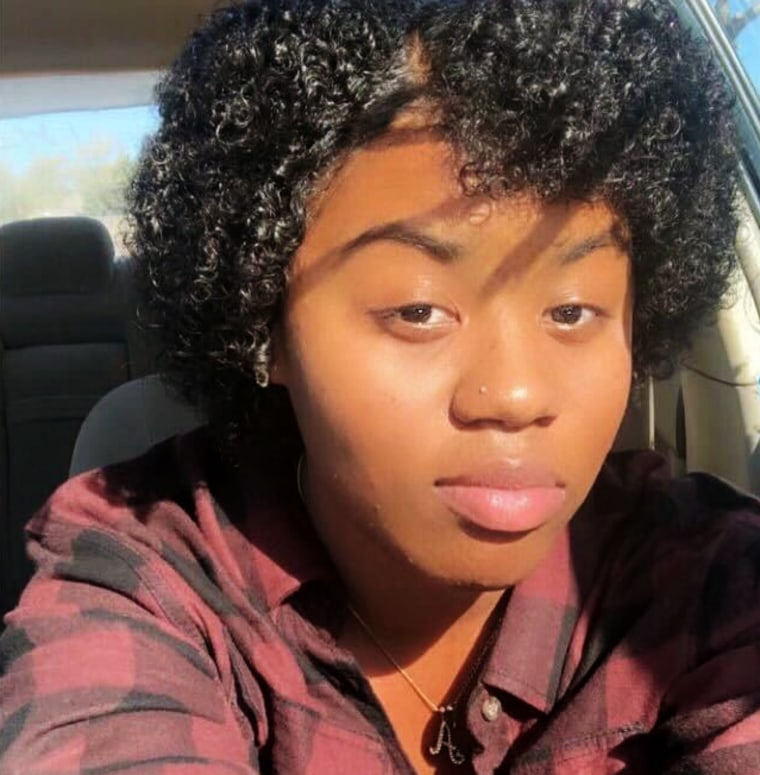
That’s why, Autumn said, when the boy in gym class said the slur yet again, she snapped. “My mindset was: ‘This is the only way it’s gonna stop. This is the only way he’s gonna learn.’”
A classmate noticed what was about to happen and hit record on a cellphone. The grainy video appears to show Autumn — who had no major disciplinary history — grabbing the boy by the hood of his sweatshirt and yelling at him between each openhanded slap to the top of his head: “You’re gonna learn! … To stop! … That f------! … N----- shit!”
As the student wriggled out of Autumn’s grasp and darted away, she continued to shout at him, tears forming in her eyes as a substitute teacher stepped between them: “It’s not OK!” Autumn screamed. “It’s racist!”
The violent outburst, which had been building for months, lasted barely 30 seconds — but it was long enough to derail Autumn’s life.
Slaton administrators sentenced her to 45 days in an alternative school for students with severe disciplinary problems, according to the complaint and records reviewed by NBC News. Distraught and convinced that her future was ruined, Autumn’s family said she ran away from home last month and made a plan to kill herself. Now out of the hospital and recovering, the girl who’d entered this school year hoping to be named valedictorian is no longer sure she’s going to graduate on time.
“They took my beautiful baby girl — who my husband and I worked so hard to mold and love and support — and they broke her,” Autumn’s mother, JaQuatta Manahan, said in an interview. “They didn’t protect her. They cast her aside like she was trash.”
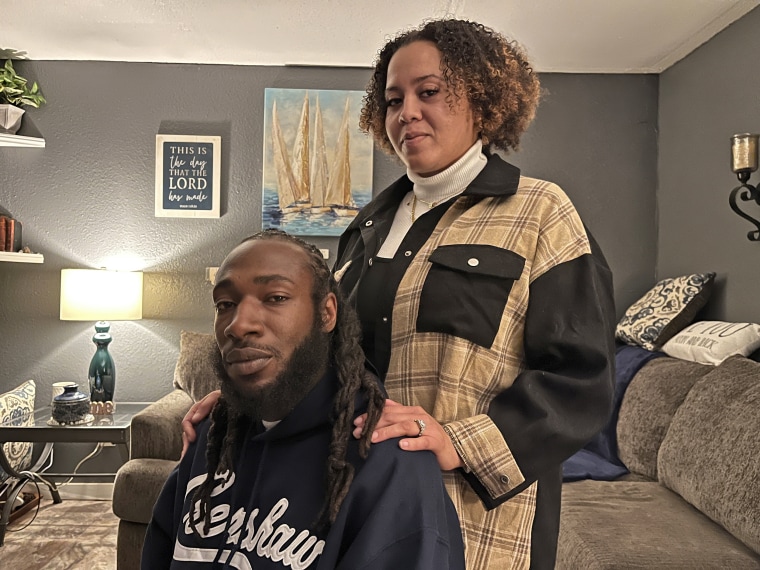
NBC News was unable to reach the family of the student Autumn was accused of assaulting.
At a time when some parents and politicians nationwide are fighting to keep difficult discussions about racism out of schools, Autumn’s story raises questions about how districts determine which types of student behavior are harmful enough to warrant harsh and decisive disciplinary action. In Autumn’s case, she and her family contend, school administrators drew a hard line, not in response to months of repeated and well-documented racial harassment, but only after a Black student acted in response to it.
Her experience is part of a troubling pattern at the Slaton Independent School District and in the broader Lubbock region in West Texas, according to a collective of civil rights advocacy groups that includes the local NAACP, the American Civil Liberties Union of Texas and the Intercultural Development Research Association, a nonprofit education equity group. The groups filed federal complaints with the U.S. Education Department’s Office for Civil Rights on behalf of more than a dozen Black students, including Autumn, who say they’ve faced racial discrimination at Slaton and in a neighboring school district.
The complaint cited Autumn’s experiences in accusing Slaton of failing to train its staff in “how to effectively and appropriately prevent, identify, and respond to racial bullying and harassment.”
Jim Andrus, Slaton’s superintendent, said federal student privacy laws prevent the district from commenting on Autumn’s case. In a written statement to NBC News, Andrus said the district trains staff regularly on how to address bullying allegations and has zero tolerance for racism.
“Slaton ISD is working diligently to prevent all forms of discrimination and harassment and will continue to do so,” he said.

In a separate filing, the civil rights groups said Black students in the Lubbock-Cooper Independent School District, which shares a border with Slaton, have been subjected to a toxic racial environment in which white students have sometimes played whipping sounds on their phones as Black students walked by. Racial slurs are prevalent in hallways, students reported, and last year the district’s Laura Bush Middle School made headlines after someone created an Instagram page called “LBMS Monkeys” and posted photos of several Black students. Despite repeated pleas from parents, administrators haven’t done enough to stop the harassment, the civil rights groups alleged in their complaint.
In an interview with “NBC Nightly News,” Lubbock-Cooper Superintendent Keith Bryant said his district has taken several steps to prevent racial harassment in recent months, including new diversity training for teachers and students. He disputed the argument that Lubbock-Cooper has fostered a toxic racial climate.
“Do I think there’s racism in our community? Absolutely,” Bryant said. “Do I think it spills over into schools? I will certainly say it can. We work really hard to try to mitigate that. There is no place in Lubbock-Cooper ISD for racism.”
Paige Duggins-Clay, a civil rights lawyer with the Intercultural Development Research Association, said the experiences of Black students in the Lubbock region underscore the need for public schools to take proactive approaches to combating racism. Autumn’s allegations, in particular, she said, reveal how dangerous it can be when schools fail to treat racist bullying as a serious threat to students’ well-being. She pointed to research that shows children who are harassed based on their race, sexual orientation, gender or national origin are more likely to struggle in school and develop mental health disorders.
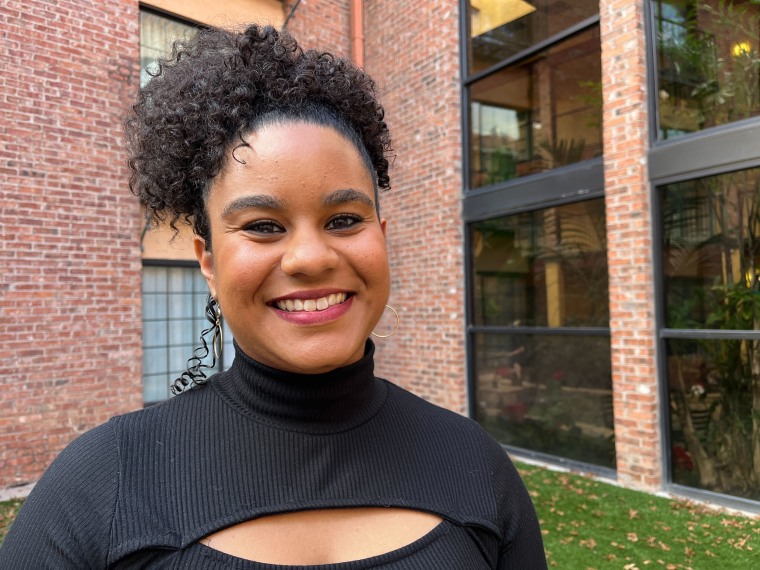
It’s ironic, Duggins-Clay said, that politicians and activists who’ve fought to stop schools from confronting racism — in the form of diversity training and changes in disciplinary policies — have done so this year under the banner of “parents’ rights.”
What about the rights of Black parents and children like Autumn? she said.
‘We’re gonna hurt you’
The 22-page civil rights complaint filed on Autumn’s behalf details alleged harassment that started the second week of school and culminated in the fight in gym class.
Autumn, whose family had moved to Texas from Ohio this summer, said she was sitting in one of her classes in August when a Hispanic classmate turned and asked what neighborhood she was living in. After she answered, Autumn said, the boy told her, “Oh, I run your block.”
She was annoyed but figured the kid was just trying to be funny or acting tough. Later in class, he repeated the line. Only, Autumn said, this time he ended the sentence by calling her the N-word.
Autumn, the oldest of three siblings, felt a chill run up her spine. She’d always loved history, and like most Black children, she’d known from a young age that the slur was associated with centuries of racial violence and oppression in America. It was shocking to hear it roll off the tongue of a classmate.
“That’s offensive,” Autumn remembered telling him.
This wasn’t the reception she’d imagined when she learned she was moving to Slaton, a railroad town of 6,000 people in the South Plains region of West Texas, where both of Autumn’s parents grew up. Slaton’s sleepy downtown looks like it was ripped from another era. Newcomers are greeted by a mural depicting Black workers toiling in a cotton field as a white farmer peers down from the seat of a tractor, along with the slogan “Slaton: Your Kind Of Town.”
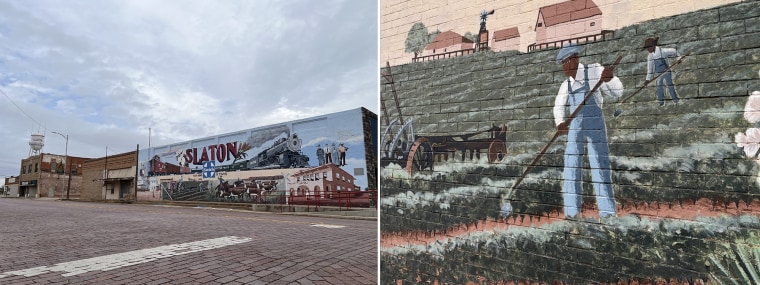
The high school, located a few blocks away, serves fewer than 400 students, the overwhelming majority of whom are white or Hispanic. Only about 1 in every 15 students is Black, which — as Autumn soon discovered — often turned them into targets. NBC News spoke to three other Black teens named or referenced in the federal complaints who said classmates routinely say the N-word in the hallways at Slaton. Two recalled white students’ calling Black classmates “porch monkeys” and mocking them with gorilla sounds.
Aware of this culture, high school officials held a campuswide assembly on the third day of school to set expectations for student behavior. Administrators specifically warned that any student caught saying a racial slur would automatically be given a three-day in-school suspension.
The threat didn’t seem to dissuade the boy who told Autumn he runs her block, she said. One week after the assembly, Autumn said, he walked past her desk and repeated the line, then he mouthed the N-word. Autumn said that when she confronted him — “What did you say?” — the boy shook his head: “Nothing.”
A few days later, Autumn said, she overheard the boy laughing with a white student. “You start it, and I’ll finish it,” she heard one of them say.
A moment later, Autumn said, one of the boys said the first syllable of the N-word, and the other student said the rest. Another student who sat nearby laughed, Autumn said. After that, she said, their singsong chant became a staple of her school day.
When Autumn told her mother, JaQuatta, about what was happening, she was outraged. She’d grown up in Slaton in the 1990s and the early 2000s, and although she remembered kids’ making racist comments, it was never this bad. That night, she ordered a special pen with an audio recording device hidden inside it and instructed her daughter to turn it on the next time the boys started harassing her.
“I wanted to have proof,” JaQuatta said. “When it comes to Black children, I’m sorry to say it, you have to have that.”

Autumn said she used the device on Sept. 7 to record the boys saying the N-word chant. Afterward, one of them can be heard saying, “Hey, we’re gonna hurt you.” After Autumn challenged them — “What you just say?” — one of the boys told her she must be on crack.
The next morning, Autumn’s mother drove to the school and demanded to meet with the principal, Mario Aguirre, who’s Hispanic, and the assistant principal, Bo Medley, who’s white. JaQuatta said she detailed the daily harassment her daughter was reporting and told them she was worried that it was taking a serious toll on her.
“She is a breath of fresh air,” JaQuatta told them. “I would love to keep it that way.”
Aguirre immediately investigated Autumn’s allegations, according to notes included in her disciplinary file and reviewed by NBC News. Autumn said she shared the recording with Aguirre and played it for him, but his notes don’t mention it. Based on interviews with multiple students, he concluded that at least one of the boys had said the slur in class, the records show. That student accused Autumn of calling him an anti-Hispanic slur, which she denied. Aguirre reminded the boy of Slaton’s policy of giving students three-day in-school suspensions for racial slurs, and “proper discipline was assigned,” he wrote.
But in the weeks that followed, Autumn said, students continued to make racist comments, with some teasing her for reporting the earlier incidents: “What, are you gonna snitch on me, too?” A white student told her she was “smart for a Black girl,” Autumn said. Another said she was “kind of pretty for a Black girl.” Later, according to Autumn, a teacher and other students who later spoke to the principal, a few students began harassing Autumn every morning over her decision to sit during the pledge of allegiance because of her religious and political beliefs. Day after day, she said, they called her “weird” and told her she needed to respect the flag.
“Leave me alone,” Autumn recalled saying in response.
JaQuatta began to notice changes in the way her daughter was dressing and in her attitude about school. “I could see that she was struggling,” she said. Then, on Sept. 29, Autumn called her from school, crying. She’d left class and locked herself in a bathroom stall after another argument over the pledge.
This time, when JaQuatta and her husband showed up to confront administrators, she hit record on her cellphone. With Autumn sitting beside them, JaQuatta chastised school officials for failing to stop the harassment.
“Using the N-word with ‘er,’ you get three days?” JaQuatta said, referring to in-school suspensions. “When my ancestors, my family — they died? They were raped and killed, if we tell that part of history when it comes to that word. And you mean to tell me my child can’t feel safe? When all she wants to do is be excellent?”
Medley, the assistant principal, assured them that he would look more closely into Autumn’s complaints. He said he was surprised to learn that Autumn was struggling emotionally. She seemed so “bubbly” whenever he saw her in the hallway and at football games, he said, and according to her teachers, she was typically a joy in class.
Autumn told Medley it was becoming harder to keep up the facade.
“It’s getting to the point where school is dreadful,” she told him. “I don’t want to be hostile. But it’s like either I’m gonna have to keep dealing with it and just cower into a corner, or sooner or later, you’re gonna have to hear me roar.”
Autumn’s father, Broderick Manahan, warned that his daughter was being pushed to the brink. How would the school react, he asked Medley, if she finally did something to defend herself?
One month later, they got their answer.
Pain and punishment
Within hours, the cellphone video of Autumn smacking the boy in gym class began to spread via text messages. Mary Pegues, a former Slaton school board member and longtime teacher’s aide in a neighboring district, was furious when she saw the clip.
Pegues, who’s Black, said she’d been warning Slaton administrators for years that the racial climate was hostile to Black children, including two nieces she’s raising. One of them, Trinity Hawkins, 15, told Pegues the harassment was so overwhelming it made her wish she weren’t Black.
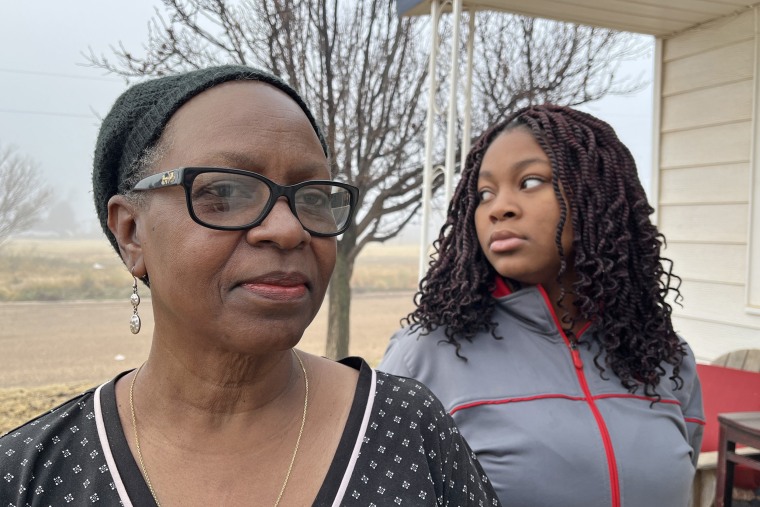
“I hate to come to you about this same old racism and bullying,” Pegues had written to Andrus, Slaton’s superintendent, in April, after Trinity came home complaining that a classmate had once again called her the N-word. “Please help me with this matter before it becomes a real problem.”
Pegues hated to see Autumn driven to violence, she said, but maybe now the district would finally take decisive action to stop racist bullying.
“I shouldn’t have gotten my hopes up,” she said.
Three days after the gym class altercation, on the morning of Halloween, Autumn and her parents once again met with administrators at the high school. This time, it was to decide how she would be punished.
Principal Aguirre opened the meeting by reading from the findings of his investigation: “Autumn assaulted Student A in PE class by striking Student A in the face and head area while restraining Student A by holding on to the hood of his sweat top. Autumn was loudly swearing during the ordeal.” Aguirre also read notes from his interviews with more than a half-dozen students, each of whom said the boy had repeatedly said the N-word over the course of a week and that Autumn had repeatedly asked him to stop.
With her parents seated next to her at a conference table and Duggins-Clay, the Intercultural Development Research Association civil rights lawyer, watching over Zoom, Autumn was given a chance to explain herself. After she acknowledged that hitting the boy “was not the best way” to handle the situation, she detailed the months of harassment that led her to that point.
She explained how she’d always loved school and how that had changed since she moved to Slaton. She wasn’t sleeping. Her grades were slipping. She was struggling to get out of bed every morning.
“I reported situation after situation, to where, personally, I felt like we were almost begging for some type of reparation for everything going on, for some type of justice,” Autumn told the administrators, tears welling in her eyes. “In the process of all of that, I feel like I was losing myself.”
Duggins-Clay unmuted her microphone and urged the officials to consider that Autumn had acted in self-defense — and to take into account that she’d previously been diagnosed with bipolar disorder and depression — before they decided how to discipline her.
“We’re not saying that there shouldn’t be accountability here,” Duggins-Clay said. “But the context matters.”
With that, the school official charged with reviewing the matter handed down her finding: She agreed with Aguirre’s recommendation. Autumn would have to serve 45 days — one-quarter of the school year — at the district’s Disciplinary Alternative Education Program, or DAEP, a boot camp-like campus where students are made to wear orange uniforms and sit facing forward at all times and are permitted to “speak only when spoken to” by staff members.
Autumn’s younger brother, Triston, 14, had been sentenced to 30 days in DAEP on the second day of school after he witnessed a group of boys vandalizing school property and failed to intervene — part of a pattern of excessively harsh discipline against Black students at Slaton, the civil rights groups alleged in their federal complaint. After having heard Triston’s accounts of being hazed and bullied at the program, Autumn was terrified at the thought of going there.
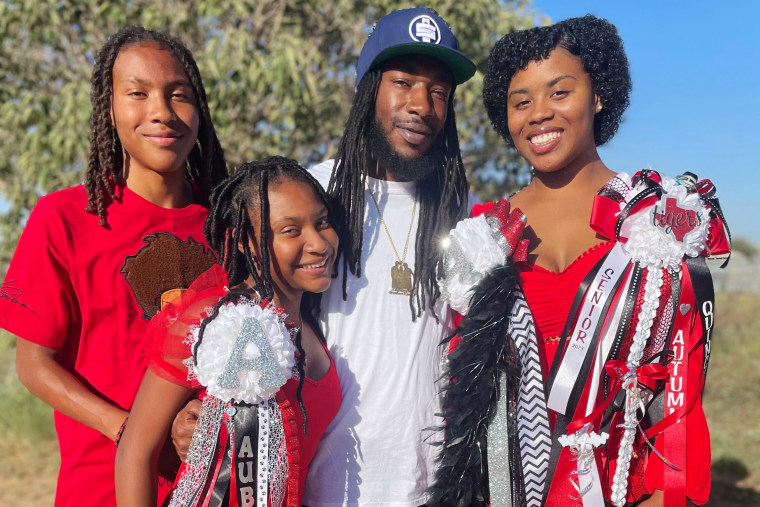
She stared down at her lap as the district official went over the fine print of her sentence. Her mother, straining to keep her cool, asked for paperwork to appeal the decision and refused to sign the document acknowledging the outcome.
Autumn was quiet as she and her family left the school and headed to their car. Once they were nearly halfway home, she finally broke down.
“I don’t want to go to that school,” she sobbed.
Her father pulled over, and together he and his wife tried to comfort and encourage her. Be strong, they said. We’re going to fight this.
Autumn didn’t say it then, but she didn’t feel like she had any fight left in her.
‘You don’t understand my cry’
About 36 hours later, late on the evening of Nov. 1, Autumn’s parents say they got a phone call from a family member. He’d gotten word that Autumn had run off and was planning to kill herself.
“I froze,” JaQuatta said. “I told my husband I needed to pray, that I couldn’t accept any more bad news. So I stayed behind, and he left.”
Autumn’s father sped across town to the spot where his daughter had threatened to take her life. He pulled her into his arms and rushed her to a hospital, where she was admitted for inpatient psychiatric care.
Later, the physician overseeing Autumn’s care wrote in her medical record, “It is my medical opinion, Autumn would benefit from a change within her school environment.”
While she was still recovering, Autumn’s parents met, once more, with Slaton High School administrators. Officially, the purpose was to hear their appeal of Autumn’s discipline. But JaQuatta saw it as her chance to tell administrators, face to face, what happened to her daughter and who she believed was to blame.
“Y’all know who I am,” JaQuatta said after an official tried to take a roll call at the start of the meeting, according to an audio recording.
When it was her turn, she reminded Aguirre and Medley about all the times she and her husband had come to them, asking the district to put a stop to the harassment before it was too late.
In all those meetings, she’d done her best to remain calm. To advocate for her daughter without raising her voice. Always saying “sir” and “ma’am.” Doing everything she could to avoid being perceived as “the angry Black woman,” she said.
But the process had broken her, just as it had her daughter. It felt as if a dam had broken inside her, and now she was yelling and crying and cursing.
“My child tried to kill herself! You don’t understand. You don’t understand my cry, as a mother. You don’t understand my pain!”
Later in the meeting, she called Aguirre and Medley “demons with f------ halos, doing the devil’s work,” and told them she was coming for their jobs.
When she was finished, the room was quiet for a moment. Then Aguirre read a statement aloud.
“At this point, there will be no dialogue between the both of us,” he said. “A decision on this matter will be delivered to you in writing no later than 10 business days from today’s date.”
Purpose and recovery
Autumn doesn’t have clear memories from the days immediately after her initial disciplinary hearing. “I blacked out,” she said. “Disassociated.”
At the time, she felt “totally defeated.” She saw the perfect image of what she’d imagined for her senior year fading away, along with her hopes for everything that was supposed to come after.
Now, six weeks later, although she hasn’t yet returned to school, she’s seeing things with a clearer perspective and is once again ready to fight on her own behalf. “After I was able to get help and get away from the environment, that’s when I realized, ‘OK, there is a purpose here.’”
In response to her appeal, Slaton administrators notified Autumn’s parents last week that they are now willing to consider a reduced disciplinary sentence based on her mental health diagnosis, which they acknowledged is a disability that, by law, must be considered in their decision.
But getting back on track at school isn’t Autumn’s only goal. She says she wants to use her ordeal to help other students like her. That’s why she agreed to file a civil rights complaint, which she hopes will lead the federal government to open an investigation and mandate reforms at Slaton.
Her father, Broderick, said changes are needed, to protect not only Black children, but also white students like the one from gym class. The way he sees it, the school district’s failure to treat racial harassment like a serious offense “allowed that young man to get hurt.”

Already, the district has made at least one change.
Last month, after Pegues and other parents spoke out at a school board meeting about Autumn’s case and what they called a pattern of racism at Slaton, high school officials revised their disciplinary policy. Under the revised rules, the district said in a statement, students will face increasingly severe punishments for saying racial slurs at school, culminating with 30 days in DAEP for third offenses.
Autumn was glad to hear about the change. But she doesn’t think it’s enough to simply punish students. Schools, she said, also need to educate children about the history and impact of racial discrimination in America and help them understand why certain words have the power to destroy — or, in her case, nearly destroy — someone’s spirit.
On a recent call with Duggins-Clay, Autumn remembered something a Slaton administrator told her early in the school year: that she shouldn’t let something as small as a word drag her down. She could feel herself getting angry all over again.
“It’s not,” Autumn said, “‘just a word.’”
If you or someone you know is in crisis, call 988 to reach the Suicide and Crisis Lifeline. You can also call the network, previously known as the National Suicide Prevention Lifeline, at 800-273-8255, text HOME to 741741 or visit SpeakingOfSuicide.com/resources for additional resources.

